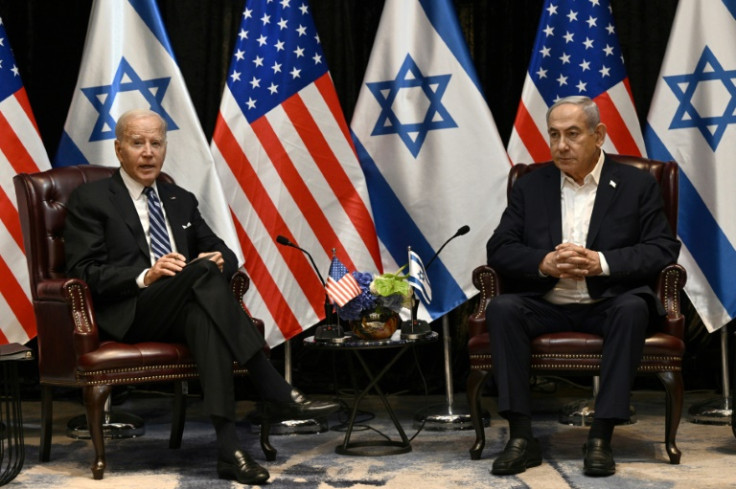Kamala Harris Could Bring Shift In Gaza War Policy

Kamala Harris's outspoken stance on the Gaza war hints at a possible shift from Joe Biden's Israel policy as she eyes the Democratic presidential nomination -- as Benjamin Netanyahu is likely to find out this week.
The US vice president will be conspicuously absent from the Israeli leader's address to the US Congress on Wednesday, in what analysts said was a clear signal about her concerns over civilian casualties in Gaza.
The 59-year-old has never contradicted Biden on Israel. Time and again, however, she has been the US administration official most loudly calling for a ceasefire in the conflict.
With Biden's shock exit from the White House race, Harris has a chance to make a "clean slate" on an issue where there has been a risk of alienating a swathe of Democratic voters ahead of November's election, said Colin Clarke, director of research at the Soufan Group.
"The Israel-Gaza issue is the one where there is the most daylight between Biden and Harris, and I think there's going to be people inside her camp that are going to push her to make that difference explicit," he told AFP.
Biden has strongly supported Israel's war on Hamas since the group's October 7 attacks, and kept up military aid despite tensions with Netanyahu.

Hamas's attack on southern Israel resulted in the deaths of 1,197 people, mostly civilians, according to an AFP tally based on Israeli figures.
The militants also seized 251 hostages, 116 of whom are still in Gaza, including 44 the Israeli military says are dead.
Israel's retaliatory military campaign in Gaza has killed at least 39,090 people, also mostly civilians, according to figures from the Hamas-run territory's health ministry.
While Harris has not broken from Biden on the issue, her statements on the conflict -- which has seen swathes of Gaza reduced to rubble -- have been more nuanced.
In March, she made what were then the strongest comments to date by any US administration official when she called for a ceasefire deal to end the "immense suffering", and criticized Israel over insufficient aid deliveries to Gaza.
The message was underlined by the first Black US vice president's choice of site to deliver it: Selma, Alabama, where in 1965 a civil rights march was violently suppressed by police on what is known as "Bloody Sunday."
It followed a pattern of remarks where she pushed the envelope of what the White House was saying about the death toll and dire humanitarian situation in Gaza.
The issue will now come to the fore when Netanyahu visits Washington this week.
Reflecting the new reality of an outgoing president and his expected replacement as Democratic contender, Biden and Harris will hold separate meetings with the Israeli premier.
Harris's camp says that a previously scheduled campaign trip to a Black sorority in Indianapolis means she cannot fulfill the usual vice presidential role of presiding over Congress during Netanyahu's visit.

Her staff moved quickly to dampen suggestions of a snub.
"Her travel to Indianapolis on July 24 should not be interpreted as a change in her position with regard to Israel," an aide told AFP, noting her "unwavering commitment" to its security.
Biden, whose tensions with Netanyahu have burst into the open in recent months despite the president's stalwart support for Israel, is also set to miss the speech.
Clarke said Harris's decision was not necessarily a "cold shoulder" but added that "clearly, if she wanted to be there, she could be... it's something of kind of signal that, hey, things are going to be different."
The Gaza war remains very much a factor in the US presidential election.
Biden's policy incensed large numbers of Democratic voters and threatened his party's hopes of winning the swing state of Michigan, which is home to a large Arab-American population.
Harris and her family have straddled the political divide on the issue. Her husband Doug Emhoff, the first Jewish spouse of a president or vice president, has made a series of public appearances to condemn rising anti-Semitism since October 7.
The war was an area where Harris could "pick a bit of a orchestrated public dispute" with Biden, said Peter Loge, director of George Washington University's School of Media and Public Affairs.
It would also help differentiate her from Trump's "all-in" support for Israel, he added.
"Harris has an opportunity to have a bit of a more nuanced position that recognizes those concerns while still supporting Israel -- to create a bit of distance to make that group (those angered by support for Israel) feel okay," Loge said.
© Copyright AFP 2025. All rights reserved.





















